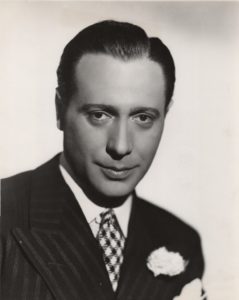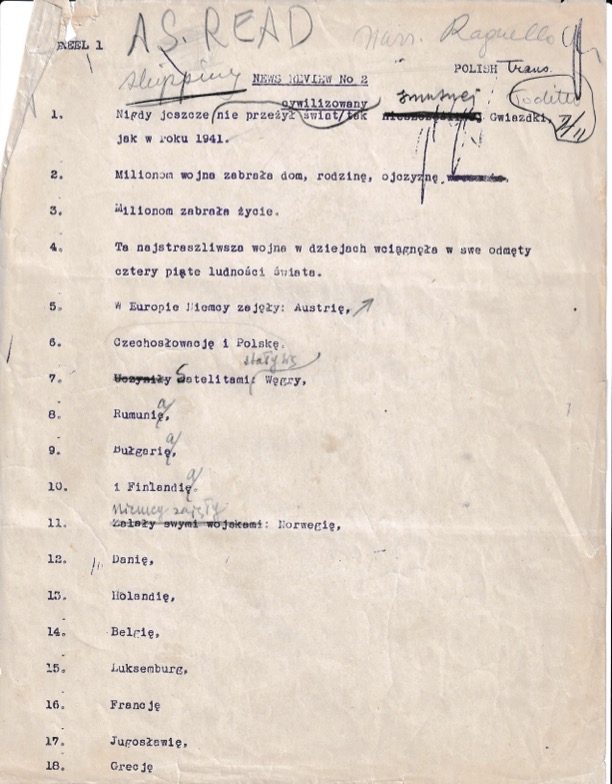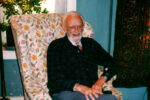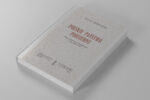Skrypt filmowy Biura Informacji Wojennej USA circa 1944
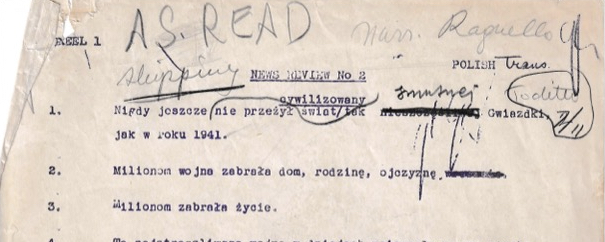
Jeden z niewielu zachowanych polskich tekstów programów Biura Informacji Wojennej USA, które działało do roku 1945 i w którym funkcjonował Głos Ameryki. Jest to najprawdopodobniej tłumaczenie angielskojęzycznego skryptu filmowego, który mógł także być wykorzystany w audycjach Głosu Ameryki, chociaż nie ma na to dowodów. Wprawdzie tekst i film były przeznaczone dla Polaków, nie ma w nich prawie żadnych informacji o roli Polski i Polaków w drugiej wojnie światowej. Uwypuklona jest natomiast rola Stanów Zjednoczonych, Rosji, Wielkiej Brytanii, Chin, i komunistycznych partyzantów marszałka Tito.
W górnym prawym rogu na pierwszej stronie wpisane jest nazwisko „Raquello” jako narratora tekstu. Edward Zylberberg, który zmienił nazwisko na Edward Kucharski a później na Edward Raquello, był urodzonym w rodzinie żydowskiej w Polsce aktorem. Wujem Edwarda, który po śmierci jego ojca wziął go pod swoją opiekę, był Beniamin Rykwert, prezes warszawskiej Synagogi im. Małżonków Nożyków przy ulicy Twardej. W późniejszej fazie swej kariery aktorskiej Edward Raquello występował w niemych filmach w Hollywood. W 1942 roku został spikerem i awansował na dyrektora programowego i regionalnego producenta-nadzorcę Biura Informacji Wojennej. W Głosie Ameryki mówiono o nim jako o bardzo utalentowanym radiowcu terroryzującym innych pracowników rozgłośni.
Konstanty Broel Plater, jedyny jak można sądzić dziennikarz Głosu Ameryki, który w czasie wojny zrezygnował z pracy w amerykańskiej rozgłośni w proteście przeciwko nadawaniu kłamstw propagandy sowieckiej, popadł w konflikt w Raquello. Nie znane są szczegóły ich konfliktu. Raquello, który walczył w wojsku polskim w 1920 roku w wojnie polsko-sowieckiej i został osobistym szoferem generała Józefa Hallera, nie był sympatykiem Stalina i Rosji sowieckiej, ale, jak można sądzić, skrupulatnie wykonywał polecenia prosowieckiego kierownictwa Głosu Ameryki w czasie wojny z hitlerowskimi Niemcami i Japonią, kiedy Stalin był niezastąpionym sojusznikiem wojennym USA. W 1945 roku Raquello przeszedł do pracy w Departamencie Stanu USA, gdzie był asystentem szefa działu produkcji Głosu Ameryki w Biurze ds. Nadawania Międzynarodowego.
Raquello był realizatorem programów sekcji rosyjskiej Głosu Ameryki, która powstała dopiero w 1947 roku ponieważ kierownictwo amerykańskiej rozgłośni obawiało się wcześniej, że rosyjskojęzyczne audycje mogłyby urazić Stalina. W pierwszych audycjach Głosu Ameryki unikano krytyki Stalina, rządu sowieckiego, i komunizmu, jednak Raquello nie był odpowiedzialny za ich zawartość programową lecz jedynie produkcję radiową. Z upływem czasu programy Głosu Ameryki stały się bardziej krytyczne w stosunku do Rosji sowieckiej i komunizmu.
Czytaj więcej: PDF „POLISH NEWS REVIEW” circa 1944
Czytaj także: Edward Raquello – zawrotna kariera polsko-żydowskiego Latynosa
This is one of the few surviving Polish texts of programs produced during World War II by the U.S. Office of War Information, which operated until 1945 and in which the Voice of America (VOA) functioned. This is most likely a translation of an English-language script for an OWI newsreel film. The audio may have been used in the Voice of America broadcasts, although there is no evidence of this. Even though the text and the film were intended for Poles, there is almost no information about the role of Poland and the Poles in the Second World War. Instead, the role of the United States, Russia, Great Britain, China, and Marshal Tito’s communist partisans is emphasized.
In the upper right corner of the first page, the name “Raquello” was written as the narrator of the text. Edward Zylberberg, who changed his name to Edward Kucharski and later to Edward Raquello, was a Polish-born (1900) actor who later in his acting career appeared in silent films in Hollywood, becoming an announcer in 1942 and rising to the program director and regional producer-supervisor of the Office of War Information. He was raised by his uncle, Beniamin Rykwert, the head of the Nożyk Synagogue, who supervised his religious education. He became known as a “very talented terror” at the Voice of America, the U.S. government radio station broadcasting abroad.
Konstanty Broel Plater, the only journalist of the Voice of America, who resigned from the American broadcasting station during the war in protest against the spreading of lies of Soviet propaganda in VOA wartime broadcasts, fell into conflict in Raquello. The details of their disagreements are unknown. Raquello, who fought in the Polish army in 1920 in the Polish-Soviet War and became the personal chauffeur of General Józef Haller, was not a Stalin or Soviet Russia sympathizer. Still, he meticulously carried out the orders of the pro-Soviet leadership of the Voice of America during the war between the United States and Nazi Germany and Japan. In 1945, Raquello joined the U.S. State Department, where he was assistant to the head of the production for the Voice of America in the Office of International Broadcasting.
Raquello worked as a radio producer in the Russian Service of the Voice of America, founded only in 1947 because the management of the U.S. government radio station had previously feared that Russian-language broadcasts might offend Stalin. Criticism of Stalin, the Soviet government, and communism was avoided in the early Voice of America broadcasts, but Raquello was not responsible for their programming content. He was supervising the selection of sound and studio recordings. Voice of America broadcasts became more critical of Soviet Russia and communism in the later years of the Cold War, starting about 1951.
